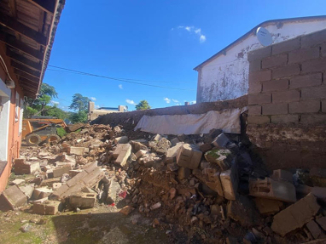Durban experienced heavy rains last week that caused serious damage to homes in Umlazi. Now Umlazi residents are to be moved to a stabler area. The decision was taken by the Human Settlements Department. Since 2022, a section of this region has tackled the risk of collapse of several houses due to weather-related disasters. The Department’s officials and other stakeholders, including the National Home Builders’ Registration Council, conducted an oversight in Umlazi’s disaster struck land on Wednesday. Minister Thembi Simelane of Human Settlements stated: “The houses were unfortunately built at the riverbank, and as more inclement weather patterns come down, we will experience erosion and movements.”
She adds that relocation is the only solution. “The intention of you very well, if the department wants to invest and assist, is relocation because you can never predict rain, when and how it will come.” The first group will be moved to temporary residential units on Thursday. At the same time, the Human Settlements Ministry says plans to build better housing for the Lamontville flood victims are advanced, citing that the government has secured land to build the new homes. Two months ago, six people were killed by floods in the area when heavy rains damaged parts of the province. Residents in the area had to be relocated to community shelters and temporary shelters.
Speaking on the plight of Lamontville resident, she said: “Town planning has been concluded there, the city has secured the land it is about a 1,000 plus households ultimately not in one day, and it covers the people who are going to be coming from Lamontville as well including those are close to the area which people will be relocated to.”
The heavy rains we are experiencing in coastal Kwazulu-Natal can be attributed to climate change. It shows more needs to be done in this area of changing weather. The destruction of property that raged across Umlazi have left its residents destitute. Relocation to ground that is higher and further from a river bank than Umlazi will be the best option. But the disaster that has collapsed and washed away homes should set alarm bells ringing that the status quo or business as usual as regards to climate change cannot continue. From Southern Africa to South East Asia to Latin America, the global south needs to be more vocal about greater action to turn to renewable energy.
As new challenges arise for the Department of Human Settlements, the government needs to adapt. There needs to be a focus of resources on conservation of climate as a shift away from carbon-based industries. It is good that the municipality and the province have a plan in place to move the residents from Umlazi. It could take weeks to fully move the such a large community of people but in the end, it will be done.
Meanwhile amongst the wreckage of Umlazi was a fence brought down by the bad weather that will possibly never be repaired.
The heavy rain allegedly crashed the fence in the early hours of Friday morning.
Speaking to The South African, Thokozile Mkhize (67), owner of the property, recalled that she was asleep when she heard a striking sound in the yard, thinking it was lightning. Mkhize said, “It was 2:30 in the morning when the striking sound woke me up. I looked outside the window, but it could not see anything as it was too dark, so I assumed it was a thunderstorm.” She says that she ended up not going to work, as the driveway was full of mud and large stones. She says “I ended up not going to work as my job requires me to use a car and I cannot work without it. The driveway was full of stones and my car was damaged, so I could not use it.”
The rain which used to be gentle has become much heavier in quantity due to climate change. People’s homes, properties, cars etc are heavily damaged as a result of the bad weather. They can’t get to work on time. They have been left stranded. Something more substantial needs to be done as regards to this shift in climate. It could take years, and the engagement of government at all three levels, the opposition (if possible), civil society, and the support of the regional communities and international bodies of which South Africa is a member of. First it will be heavy rains, next it will be higher sae levels. If both Pretoria, Pietermaritzburg, and eThekwini do not address this ticking time bomb of a situation seriously, South Africa is doomed. Doomed along with the rest of Africa to lose a significant part of its low-lying coastal land.
Article written by:
Yacoob Cassim
Journalist at Radio Al Ansaar






